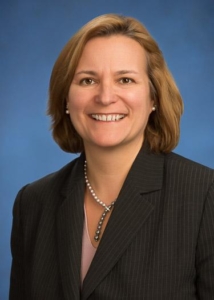 Welcome to Pride Week on The Glass Hammer — we’ll be profiling successful LGBT business women all week long!
Welcome to Pride Week on The Glass Hammer — we’ll be profiling successful LGBT business women all week long!
Julie Harris, Managing Director at Goldman Sachs, had a master plan when she entered college – or so she thought. “I come from a blue collar family,” said Harris, “and while my parents have always been incredibly supportive, they did not have a lot of advice on career choices, so I picked a major that seemed challenging and figured I would get a good job. That was my mental model.”
Harris decided that she was going to major in Computer Science and get a job programming. This trajectory probably would have served Harris very well had she not determined in her senior year of college that while she was very interested in applying technology to business problems, she did not love programming.
It was at this juncture that Harris first tapped into a bit of profound professional wisdom. Harris said, “It was the first time I made the distinction between knowing what you can do and are good at, versus knowing what you love doing.” She adds, “This is something I have thought a lot about throughout my career when making choices. When you follow passions instead of just capabilities, it can be the difference between good and great.”
Although Harris had just spent four years preparing to graduate with a Computer Science major and enter the workforce as a top notch programmer, she was unwilling to settle. So, instead of heading to a traditional programming job, Harris decided to apply her technology background in a burgeoning industry at the time known as consulting.
“All the big accounting firms started building consulting arms because clients wanted total solutions.” Harris continued, “I started working at what was then known as Arthur Andersen, which became Andersen Consulting, and is now Accenture, in the Management Information Consulting division.” Out of the nine years Harris spent there, she only focused on programming for two of those years, ultimately moving to business analysis roles which focused more on application of technology to business problems .
Even though this experience formed the foundation for Harris’ professional career, she gleaned much more from her time as a consultant. Harris explained, “The great thing about a firm like that is that it taught someone who didn’t have professional experience how to be structured and disciplined, essentially how to be a professional.”
If Harris was going to continue to be a key player in the corporate arena she knew she had to familiarize herself with the business landscape in order to successfully navigate it. Although her knowledge of business, particularly in the financial services sector, was limited, Harris was not deterred. Instead, this motivated her to enroll in the MBA program at the Kellogg School of Management at Northwestern.
